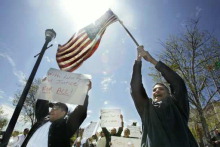Reply-To: Avi Chomsky achomsky@salemstate.edu
To: North Shore Colombia Solidarity Committee Date: Apr 27, 2006 7:47 PM
Jobs with Justice is one of the many organizations supporting the national effort to make May 1 a day in support of immigrants' rights.
Avi

Greetings,
Un Dia Sin Inmigrantes
A Day Without Immigrants
May 1, 2006
Quedarse en casa
Stay At Home
Todo el Dia
All Day
No ir a trabajar
Don’t Go to Work
Si tienes que trabajar usar un liston blanco en el brazo o una playera
If you have to go to work, wear a white arm band or a white shirt
No ir de compras – Don’t go shopping
No Comprar gas o licor – Don’t buy gas or liquor
No Usar Transporte Publico – Don’t use public transportation
Los Estudiantes
The Students
Usar un liston blanco en el brazo o una playera blanca
Wear a white arm band or a white shirt.
Invita: Coalición de Organizaciones de Massachussets por una Reforma Migratoria Justa y Humanitaria
Sponsored by: Coalition of Massachussets Organizations for Just and Humanitarian Immigration Reform
UNIDOS LO PODEMOS LOGRAR!
Together, we can do it!
The following actions are being led by community organizations across Massachusetts and New England
More information on immigrant rights and flyers for some events can be found at www.massjwj.net and
www.miracoalition.org :
Amherst, MA: 12:00 PM, Monday May 1st Rally on the Amherst Town Common (Eduardo Suárez, 413-687-0399)
Boston, MA. SEIU 615 will hold a rally at 1PM at P.O. Square for the Miami U. Hunger Strike and then Rally the state house at 3PM for UNICCO workers
Cambridge, MA: Support and organize a City Council hearing at Centro Presente (617-497-7247)
Cambridge, MA: 1:00 PM, Harvard University walkout and teach-in (contact the Harvard May Day Coalition)
Chelsea. MA: 2:00 PM – 6:00 PM, Circle training for the community, 101 Park Street, Chelsea (Marina, 617-889-5210 x255)
Chelsea, MA: 3:00 PM – 4:00 PM, March from Central Square East Boston to Chelsea City Hall (Chelsea, 617-889-6080 or East Boston, 617-686-5018)
Framingham, MA: 6:30 PM, Immigrant Workers Mass (English and Spanish), Saint Stephen's Catholic Church, 251 Concord Street
Framingham, MA: 8:00 PM (Sunday, April 30, 2006), Community's expression of their will and vigil (Portuguese and English), a 24 hour event, Saint Tarcisius Catholic Church, 562 Waverly Street (Bill Black, Metropolitan Interfaith Congregations Acting for Hope, 978- 443-6027)
Lowell, MA: 2:00 PM – 5:00 PM (Sunday, April 30, 2006), Bread & Roses: A Cultural Event to celebrate workers and support immigrant rights, Boardinghouse Park, (978-452-7523)
Manchester, NH: 4:00 PM – 6:00 PM, Rally at Manchester City Hall Plaza, (Leticia Ortiz, 603-219-6542)
Providence, RI: 3:30 PM, March from Central High Scholl to State Capitol (Rachel Miller, Jobs with Justice, 401-454-4766)
Somerville, MA: 4:00 PM – 6:00 PM, Rally and vigil in front of Foss Park Put together by local immgrant rights coalition (617-623-7370 ext. 118)
Worcester, MA: 4:00 PM – 6:00 PM, Rally for Immigrant Rights, City Hall
We need volunteers! Can you be on call to go on a delegation May 2nd in cases where workers were fired? Please email jennifer@massjwj.net with your contact info! Thanks!
Massachusetts Jobs with Justice Statement of Support
As a coalition of eighty labor, community, and religious organizations we support the goals of the May 1st Day of Action for immigrant justice. Even as we speak, leaders in Congress are creating a climate that condones the denigration of human rights of a community of people whose contributions to our social, civic and economic life make our society strong.
Yes, our immigration system is broken and needs to be fixed. In fixing this system that has gone wrong we must keep in mind the principles on which this country was founded. We are a nation of immigrants. For hundreds of years, people seeking refuge from poverty, starvation, persecution and war migrated in hopes of a better life. The same is true today. Even as we enjoy material comforts here in the U.S. we are connected to the billions of people who live under dire conditions around the world. It is just these conditions that force so many people to make the difficult decision to leave their families and homes.
The tradition of May Day started in the US in 1886 during the struggle for the 8-hour day, a struggle lead by immigrants. On May 1st, 2006 immigrants and their allies across the nation will make the courageous decision to join a national boycott. Hundreds of thousands of people will decide not to go work, not to go to school, to close their business for the day and to participate in actions throughout the day.
This is not a decision the immigrant community has come to lightly, this is a response to brutal attempts in Congress and in local government to suspend and further erode the basic human rights of immigrants. We are proud to stand with every worker and student who chooses to participate in the boycott at whatever level they are able to and we will continue to stand with every community member on May 2nd and beyond.
We will continue the call for comprehensive immigration reform that creates a plan for legalization for the estimated 11 million undocumented immigrants in the United States, that creates a path to citizenship, that allows for the reunification of families across borders, that promotes labor rights, that promotes pathways to education and to success and that creates ways for immigrants to become educated citizens of the United States.
--------------------------------------------------------------------------------
Visit the web address below to tell your friends about this.
Tell-a-friend!
If you received this message from a friend, you can sign up for
Massachusetts Jobs With Justice





